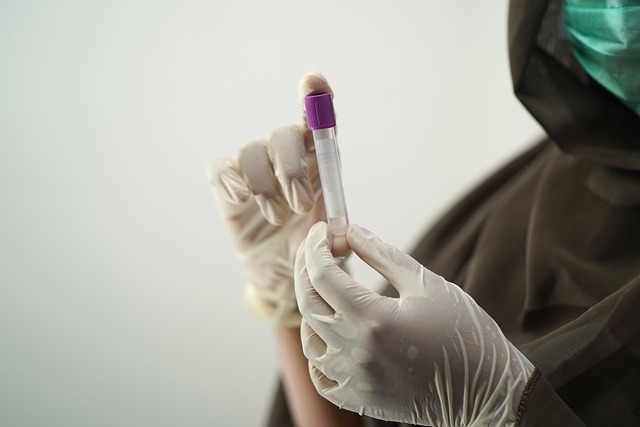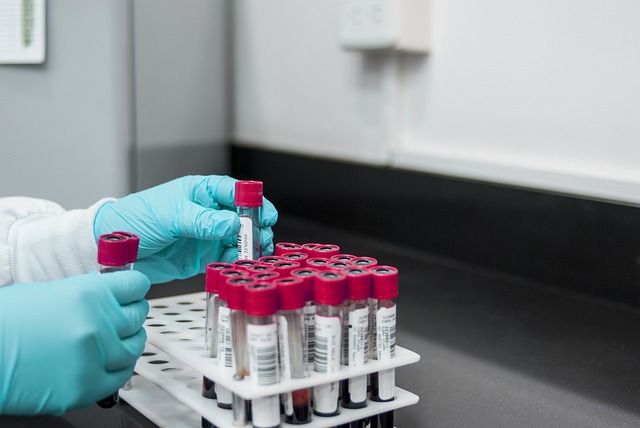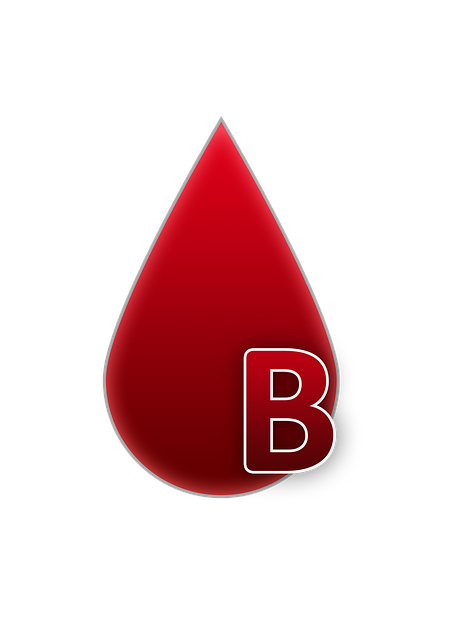The UK Advanced Thyroid Blood Test is a sophisticated diagnostic tool that provides comprehensive and accurate assessments of thyroid health. This test goes beyond traditional thyroid tests by including additional markers to give a detailed picture of hormone levels, including TSH, free T3, and free T4, as well as indicators for autoimmune thyroid disease such as TPO and thyroglobulin antibodies. It is invaluable for precise diagnosis and effective management of conditions like hyperthyroidism, hypothyroidism, and thyroiditis, enabling early detection of subtle dysfunctions. Its high sensitivity and specificity make it an indispensable aid for endocrinologists and primary care physicians, allowing for personalized treatment plans based on individual patient needs. The test's role is crucial in the UK healthcare system, offering nuanced insights that facilitate better health outcomes for those with thyroid disorders by aligning with the latest advancements in clinical endocrinology.
Medical professionals play a pivotal role in the early detection and management of thyroid disorders. This article delves into the intricacies of the UK Advanced Thyroid Blood Test, an essential diagnostic tool for assessing thyroid health. We will explore the anatomy of the thyroid gland and its hormones, providing a clear understanding of what the tests measure. Furthermore, we will guide readers through interpreting thyroid function test results, highlighting the diagnostic implications and clinical management strategies within the UK healthcare framework. This comprehensive guide underscores the importance of precise thyroid diagnostics in patient care, ensuring the best possible outcomes for those undergoing evaluation.
- Understanding the UK Advanced Thyroid Blood Test: A Comprehensive Guide for Medical Professionals
- Anatomy of the Thyroid Gland and Its Hormones: What the Tests Measure
- Interpreting Thyroid Function Test Results: Diagnostic Implications and Clinical Management Strategies in the UK Context
Understanding the UK Advanced Thyroid Blood Test: A Comprehensive Guide for Medical Professionals

The UK Advanced Thyroid Blood Test is a sophisticated diagnostic tool that enables medical professionals to assess thyroid function with high precision. This test goes beyond the standard thyroid function tests by including additional markers that provide a more detailed picture of thyroid health. It encompasses measurements such as free T3, free T4, and thyroid-stimulating hormone (TSH), along with antibodies associated with autoimmune thyroid diseases like thyroperoxidase (TPO) antibodies and thyroglobulin antibodies. Understanding the interpretation of these results is crucial for accurately diagnosing and managing conditions such as hyperthyroidism, hypothyroidism, and thyroiditis. The test’s comprehensive nature allows for early detection of subtle thyroid dysfunctions that might otherwise be overlooked, thereby improving patient outcomes and treatment efficacy.
For medical professionals, the integration of the UK Advanced Thyroid Blood Test into clinical practice represents a significant advancement in the management of thyroid disorders. It is particularly beneficial in cases where patients present with non-classical symptoms or when there is a suspicion of subclinical thyroid disease. The test’s ability to provide a broader view of thyroid function is complemented by its high sensitivity and specificity, making it an indispensable tool for endocrinologists and primary care physicians alike. Understanding the nuances of this advanced test empowers healthcare providers to tailor treatment protocols to individual patient needs, leading to more personalized and effective care in the management of thyroid diseases.
Anatomy of the Thyroid Gland and Its Hormones: What the Tests Measure

The thyroid gland, a critical endocrine organ located in the neck, plays a pivotal role in regulating metabolism, growth, and development through the synthesis and secretion of thyroid hormones. These hormones, triiodothyronine (T3) and thyroxine (T4), are essential for maintaining homeostasis within the body. In the UK, advanced thyroid blood tests, such as the Advanced Thyroid Profile (ATP-3), are utilized to measure these hormones, providing a comprehensive assessment of thyroid function. This test includes measurements of TSH (thyroid-stimulating hormone), Free T3, and Free T4 levels. TSH, produced by the pituitary gland, serves as a key indicator of thyroid health; it stimulates the thyroid to produce T3 and T4. Abnormal levels of TSH can indicate hyperthyroidism or hypothyroidism, conditions characterized by excess or insufficient hormone production, respectively. Free T3 and Free T4 tests are crucial because they reflect the amount of thyroid hormone that is actively circulating in the bloodstream, unaffected by binding to proteins. These measurements allow for accurate diagnosis and management of thyroid disorders, ensuring appropriate treatment outcomes. The Advanced Thyroid Blood Test is an invaluable tool for medical professionals in the UK, providing detailed insights into thyroid function, thereby aiding in the early detection and effective management of thyroid-related diseases.
Interpreting Thyroid Function Test Results: Diagnostic Implications and Clinical Management Strategies in the UK Context

In the UK, the advanced thyroid blood test is a pivotal tool for medical professionals in diagnosing and managing thyroid disorders. These tests measure various thyroid hormones and related parameters, including Thyroid-Stimulating Hormone (TSH), Free Thyroxine (FT4), and Free Triiodothyronine (FT3). Interpreting these results requires a nuanced understanding of the reference ranges that align with the British Thyroid Association guidelines. For instance, an elevated TSH level typically indicates hypothyroidism, while a suppressed TSH may suggest hyperthyroidism. However, TSH values can be influenced by factors such as age, medication, and individual pituitary gland variability, necessitating a comprehensive clinical evaluation to rule out or confirm thyroid pathology. The interplay between thyroid hormones and their impact on metabolism, growth, development, and mood underscores the importance of accurate test interpretation. Clinical management strategies are then tailored based on these results, with levothyroxine being the mainstay treatment for hypothyroidism and potential use of anti-thyroid medications or radioactive iodine for hyperthyroidism. In cases where subclinical thyroid disease is detected, regular monitoring and patient education are crucial to optimize outcomes and address associated comorbidities, which may include cardiovascular risks and osteoporosis. The UK context emphasizes personalized medicine, ensuring that treatment decisions are informed by a thorough analysis of thyroid function test results alongside clinical presentation, age, and risk factors, thereby improving patient care and outcomes in the management of thyroid disorders.
In conclusion, the UK Advanced Thyroid Blood Test stands as a pivotal diagnostic tool for medical professionals, offering precise insights into thyroid function. By understanding the anatomy and hormonal outputs of the thyroid gland, healthcare providers can effectively interpret test results, leading to informed clinical management decisions. This comprehensive guide underscores the importance of such advanced tests in accurately assessing thyroid disorders, thereby enhancing patient care within the UK’s healthcare system. Medical professionals are encouraged to integrate this knowledge into their practice for improved patient outcomes.
